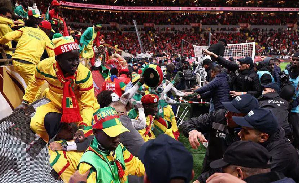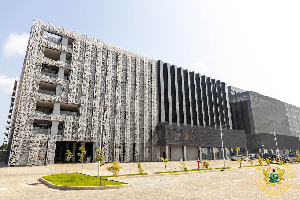(Part I)
By Dr. Michael J.K. Bokor
Monday, May 19, 2014
The history of labour agitations for better conditions of service is as clear as it reminds us of the general malaise that characterizes governance at all levels.
Are Ghanaian labour leaders really serving the interests of workers or just using workers’ agitations to muddy the waters? Where is the evidence that they are doing well to boost productivity first, and then, ask for service conditions to be improved thereafter? Without improved productivity, any persistent agitation for improved remuneration is mischievous and out-of-control.
Some of them have found a very cunning way to muddy the waters in which they swim by politicizing their activities, usually taking to the side of the opposition and behaving as if they are politicians and not workers' leaders.
The unfortunate sequel, though, is that they manipulate workers' sentiments to create the impression that it is the government of the day that is the problem. Indeed, they are the problem that the workers should tackle.
So, when we add them to our lazy politicians in charge of national affairs, we come face-to-face with the spook that scares us stiff about the Ghanaian situation. Did we go or did we come?
Take a short tour through the industrial atmosphere since the First Republic to contemporary times and you won’t see anything particularly striking to suggest that Ghanaian workers and their leaders really know how to do things to situate themselves in changing times and circumstances. It is always “from Mfum to Baba Yara… and it is a goal!!” Sadly, the Mfums and Baba Yaras died long ago with their skills.
The sad reflection is that the Ghanaian workers and their leaders have no skills to influence how they go about doing things to their own advantage and that of the country except recourse to the predictable “strike action” that the govern of the day has become immune to.
All over the world, workers’ interests have always been difficult to secure or sustain. What workers demand to live their lives in comfort is almost always at variance with what the state/employers also need to stay afloat. The history of “Workers Day” (May 1) explains it all.
We in Ghana have our own history to tell about workers and their standing as far as the national economy is concerned. And there is more beyond the confines of the national economy to prove that one doesn’t necessarily have to work to live or live to work! At any cost!
I am particularly intrigued by the politics of attrition at the labour front that characterizes its relationship with government over the years. Particularly relevant is the arguments influencing the current TUC leadership’s attitude to the Mahama-led government’s position on certain issues that affect its relationship with organized labour.
Talk about the Economic Partnership Agreement with the European Union and narrow everything down to the haggling over the daily minimum wage and fears that the government is in league with the IMF for a bail-out that will translate into the wanton retrenchment of workers (without prior negotiation with organized labour). Too bad, one may assume.
There is too much happening to suggest that a thick cloud of suspicion, mistrust, distrust, and disdain exists to pit the leadership of organized labour against the major employer (government). Needless animosity if both government and the leadership of organized labour really place the national interests above sectional or individual ones.
Within this context, one wonders whether these parties don’t want to think outside the box of minimum wages as the panacea to solving workers’ problems or redressing their grievances. Ghanaian workers will certainly be happy if the government and their own leaders come out with long-lasting measures to “cushion” them than this erratic and perennial minimum wage regime ritual. No need for this annual rigmarole of negotiations on what is due the worker. There is too much lazy thinking going on here.
The worn-out and tired unidimensional strategy of demanding wage increases or recourse to strike action is too unproductive for our economy and anachronistic in contemporary times. It must be discarded for better strategies that will not hurt either the employer or the employee.
Have the Ghanaian authorities (the TUC especially) learnt anything from other systems to do better industrial relations work than what has been happening in Ghana since independence? And is the government itself sensitive to the needs of workers to provide what they need to live their lives in comfort and be willing to sacrifice their lot for nation-building?
The Swiss people have just given a good example on how to do things, as reported by the BBC (See: http://www.bbc.com/news/business-27459178). Of course, every system has its own parameters and we in Ghana are not bound to swallow anything from other systems just because it is working well for them. But we can learn the ropes therefrom to move on and not be stuck in the negative groove!!
What have the Swiss authorities done to the workforce for them to be so patriotic? Can the Ghanaian TUC learn any useful lesson from the Swiss example to shape and shave its industrial relations work? What does it have to help government boost productivity so that the proceeds can be distributed equitably? Certainly, calling for an industrial action is far easier than doing what will boost productivity for mutual benefits. Which way does the TUC want to go? We are anxious for its response.
Obviously, my bent is that there is more to harvesting the benefits of a working life than recourse to raw industrial action. When attention shifts from counting the hours to what one can do within the hour, the situation should improve for our good. That is the challenge for the TUC leadership in our time!!
I shall return…
• E-mail: mjbokor@yahoo.com
• Join me on Facebook at: http://www.facebook.com/mjkbokor to continue the conversation.
Opinions of Wednesday, 21 May 2014
Columnist: Bokor, Michael J. K.














